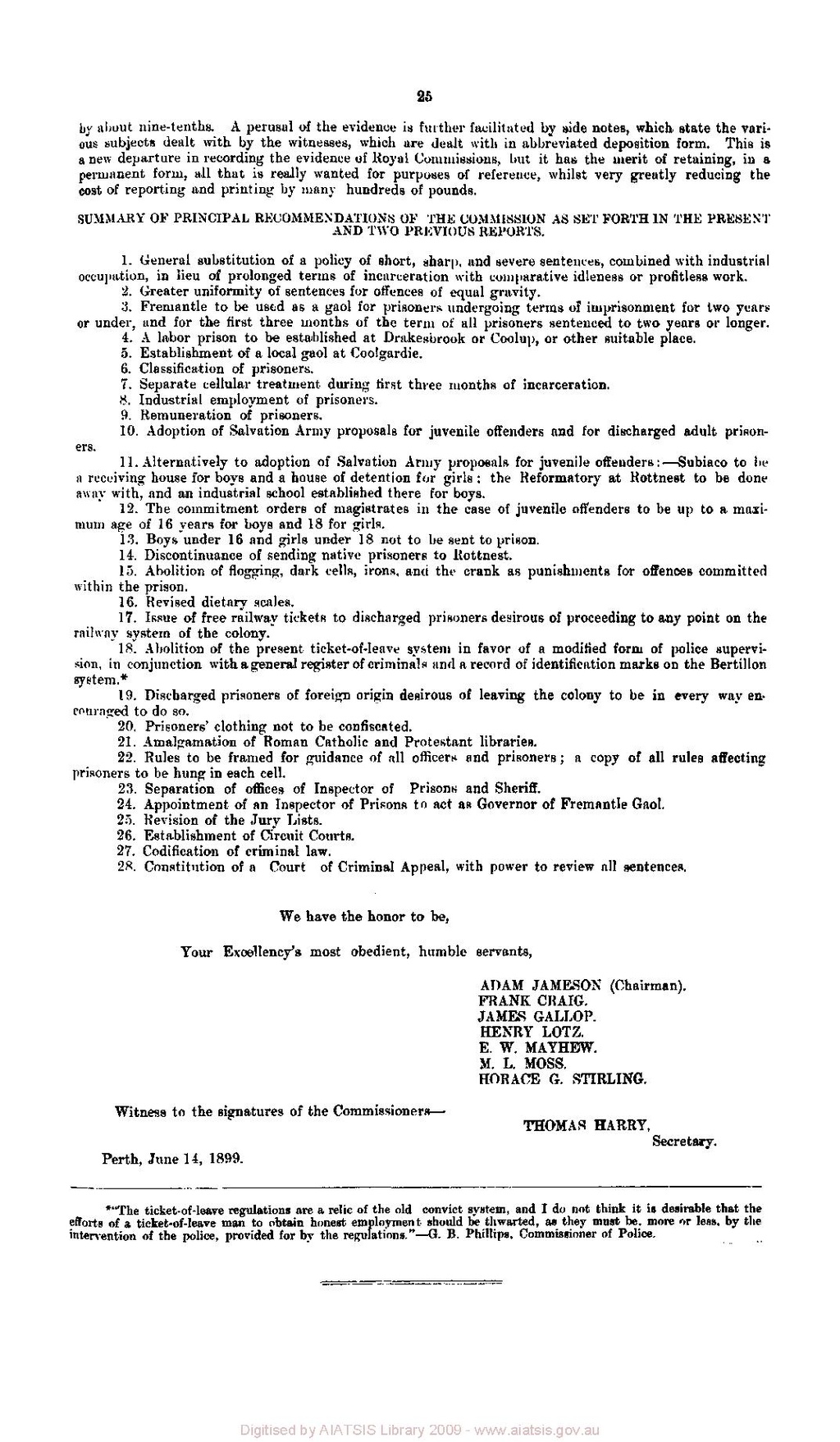25
by about nine-tenths. A perusal of the evidence is further facilitated by side notes, which state the various subjects dealt with by the witnesses, which are dealt with in abbreviated deposition form. This is a new departure in recording the evidence of Royal Commissions, but it has the merit of retaining, in a permanent form, all that is really wanted for purposes of reference, whilst very greatly reducing the cost of reporting and printing by many hundreds of pounds.
SUMMARY OF PRINCIPAL RECOMMENDATIONS OF THE COMMISSION AS SET FORTH IN THE PRESENT AND TWO PREVIOUS REPORTS.
- General substitution of a policy of short, sharp, and severe sentences, combined with industrial occupation, in lieu of prolonged terms of incarceration with comparative idleness or profitless work.
- Greater uniformity of sentences for offences of equal gravity.
- Fremantle to be used as a gaol for prisoners undergoing terms of imprisonment for two years or under, and for the first three months of the term of all prisoners sentenced to two years or longer.
- A labor prison to be established at Drakesbrook or Coolup, or other suitable place.
- Establishment of a local gaol at Coolgardie.
- Classification of prisoners.
- Separate cellular treatment during first three months of incarceration.
- Industrial employment of prisoners.
- Remuneration of prisoners.
- Adoption of Salvation Army proposals for juvenile offenders and for discharged adult prisoners.
- Alternatively to adoption of Salvation Army proposals for juvenile offenders:—Subiaco to be a receiving house for boys and a house of detention for girls; the Reformatory at Rottnest to be done away with, and an industrial school established there for boys.
- The commitment orders of magistrates in the case of juvenile offenders to be up to a maximum age of 16 years for boys and 18 for girls.
- Boys under 16 and girls under 18 not to be sent to prison.
- Discontinuance of sending native prisoners to Rottnest.
- Abolition of flogging, dark cells, irons, and the crank as punishments for offences committed within the prison.
- Revised dietary scales.
- Issue of free railway tickets to discharged prisoners desirous of proceeding to any point on the railway system of the colony.
- Abolition of the present ticket-of-leave system in favor of a modified form of police supervision, in conjunction with a general register of criminals and a record of identification marks on the Bertillon system.∗
- Discharged prisoners of foreign origin desirous of leaving the colony to be in every way encouraged to do so.
- Prisoners' clothing not to be confiscated.
- Amalgamation of Roman Catholic and Protestant libraries.
- Rules to be framed for guidance of all officers and prisoners; a copy of all rules affecting prisoners to be hung in each cell.
- Separation of offices of Inspector of Prisons and Sheriff.
- Appointment of an Inspector of Prisons to act as Governor of Fremantle Gaol.
- Revision of the Jury Lists.
- Establishment of Circuit Courts.
- Codification of criminal law.
- Constitution of a Court of Criminal Appeal, with power to review all sentences.
We have the honor to be,
Your Excellency's most obedient, humble servants,
- ADAM JAMESON (Chairman).
- FRANK CRAIG.
- JAMES GALLOP.
- HENRY LOTZ.
- E. W. MAYHEW.
- M. L. MOSS
- HORACE G. STIRLING
- Witness to the signatures of the Commissioners—
- Perth, June 14, 1899.
∗11 "The ticket-of-leave regulations are a relic of the old convict system, and I do not think it is desirable that the efforts of a ticket-of-leave man to obtain honest employment should be thwarted, as they must be, more or less, by the intervention of the police, provided for by the regulations."—G. B. Phillips, Commissioner of Police.
